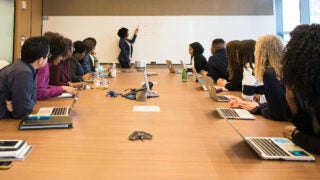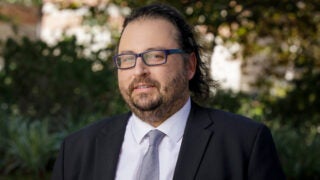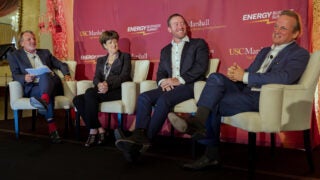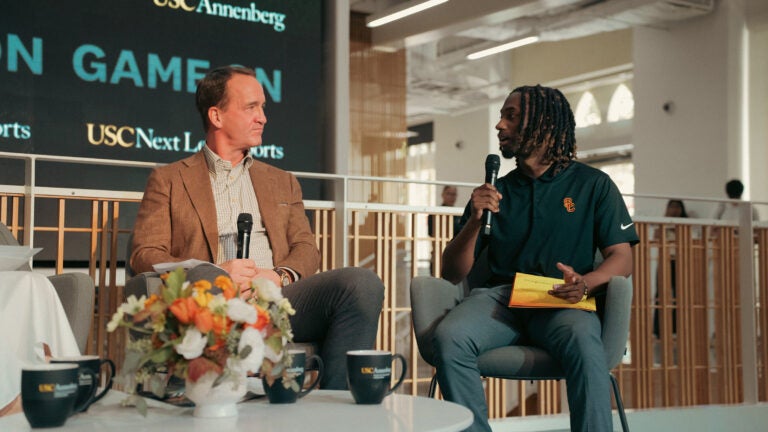
Peyton Manning listens to a question from student Elijah Patterson during Thursday’s USC Next Level Sports event in Wallis Annenberg Hall. (Photo/Areon Mobasher)
Peyton Manning talks sports media with students at USC Next Level Sports event
The two-time Super Bowl winner and NFL Hall of Famer came to USC Annenberg to discuss the creation of his company, Omaha Productions.
As a two-time Super Bowl-winning quarterback and NFL Hall of Famer, Peyton Manning is used to the spotlight.
Still, Thursday afternoon, a decade after his retirement from professional football, was different. There were no stadium lights, screaming fans or 300-pound linemen trying to tackle him.
Instead, about 600 USC students, faculty and staff gathered in the Wallis Annenberg Hall forum to hear Manning talk about life after football and his wildly successful venture into sports media.
“I didn’t know exactly what I wanted to do when I finished playing,” Manning said. “I’d been talked to earlier in my career about a production company, and I probably got some false information that you had to take a lot of risks and hire a bunch of people and really spend a lot of time in developing it — and that really wasn’t the case.
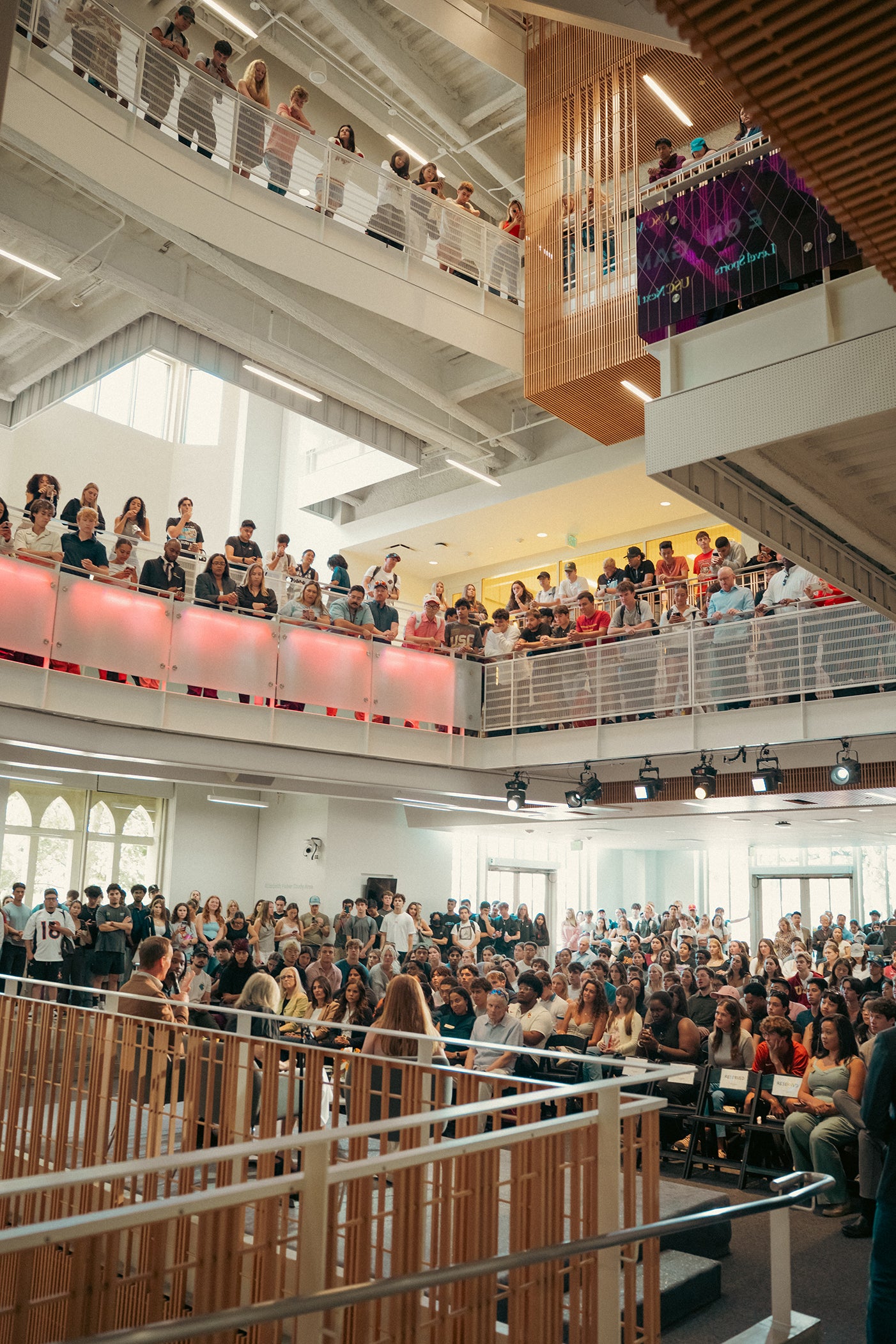
“If you partner with really good people, smart people, you can build it with not as much risk.”
The talk was part of USC Next Level Sports, a partnership between the USC Annenberg School for Communication and Journalism and the USC Marshall School of Business. On this day, Manning sat onstage with USC Annenberg Dean Willow Bay and two USC students — one from each school — to answer questions about his media company, Omaha Productions, which has won numerous awards, produced major scripted and live programs, and is valued at $700 million to $800 million.
“I can be a part of projects that I don’t physically have to be in,” Manning said. “I don’t have to be the quarterback. … I can be the offensive coordinator in the press box, giving someone else their platform to tell a story.”
Starting Omaha
Omaha Productions is a content creation and production agency started in 2020 by Manning and Jamie Horowitz. Manning’s brother Eli, who is also a two-time Super Bowl-winning quarterback, collaborates with the team. Omaha’s content ranges from commercials to the upcoming Hulu series Chad Powers, documentaries like Netflix’s Quarterback, and live shows like the Manningcast on ESPN’s Monday Night Football — the latter of which has won Manning and the Omaha team three Sports Emmy Awards.
“When you stop playing football, what you miss the most is being part of that team,” Manning said. “And now I’m on the Omaha team, which I really enjoy.”
The son of 14-year NFL veteran quarterback Archie Manning, Peyton Manning was an All-American at the University of Tennessee. He was drafted first overall in the 1998 NFL draft by the Indianapolis Colts and went on to play 18 seasons in the NFL with the Colts and the Denver Broncos. His 71,940 passing yards and 539 passing touchdowns both rank third all-time for an NFL career.
Though results like that speak to a high level of confidence, Manning said that stepping into a completely new role and career path presented its own set of challenges.
“I think the mistake people make is they assume because you’re the quarterback or CEO or manager or president, that that makes you a leader automatically, and it really doesn’t,” Manning said. “You have to earn the mantle of leadership.”
The new sports media landscape
Though Thursday’s talk centered on Omaha Productions, the company is just one example of athlete-owned and -led enterprises that are reshaping sports media. LeBron James has SpringHill Company, Kevin Durant has Boardroom, and Tom Brady and Michael Strahan are behind Religion of Sports. Each company relies on athlete-driven narratives to tell sports stories in new and innovative ways.
For Manning and the Omaha team, the focus is creating unifying and positive content that doesn’t take itself too seriously. Case in point: Chad Powers. What is now a full series on Hulu starring Glen Powell started as an Eli Manning prank video.
“The thing I’ve learned is, don’t tell me that’s a bad idea or that won’t be a show,” Manning said. “Anything could turn into a show, if you get the right people.”
Manning said that even Manningcast didn’t seem like a real idea when it was pitched. The show features the Manning brothers watching Monday Night Football from their couches, with a few Zoom interviews with football-loving celebrities scattered throughout. The idea was to see how NFL legends watch football as fans, though the Mannings were a bit skeptical that the idea would work.
“Eli thought ESPN was joking,” Manning said.
However, the simple recipe turned into a hit. The Manningcast is in its fifth season and is contracted with ESPN for several more years.
“I’m sorry for the cheesy football analogies, but we just keep trying to throw up completions, and sometimes those short, little 10-yard completions can turn into a touchdown,” Manning said.
An inspiration to the next generation
USC Annenberg senior Campbell Donovan, seated onstage with Bay and Manning, asked Manning about unexpected lessons from his time at Omaha Productions.
“You can tell that he is truly an MVP storyteller just from the way he answered our questions alone,” said Donovan, a communications major with minors in screenwriting and education. “I think he truly practices what he preached, being a great listener and prioritizing preparation.”
The other student onstage, USC Marshall senior Elijah Patterson, asked Manning for advice on how to enter the field of sports media — and how to navigate the name, image and likeness (NIL) era successfully.
“I’ve looked up to him not just as a football player, but as the epitome of someone being able to market themselves as an individual,” said Patterson, a business administration and management major.
Both student speakers agreed that having the opportunity to ask Manning questions was a uniquely USC experience.
“There is no other school that would bring Peyton Manning on a random Thursday and allow students to sit on stage with him and ask questions,” Patterson said.

